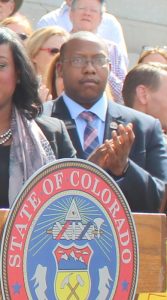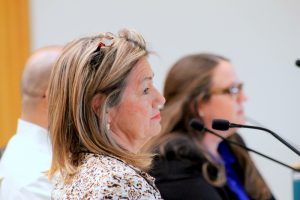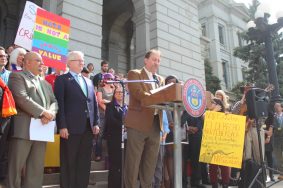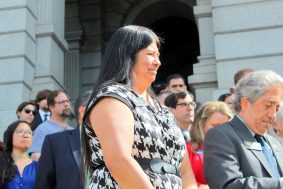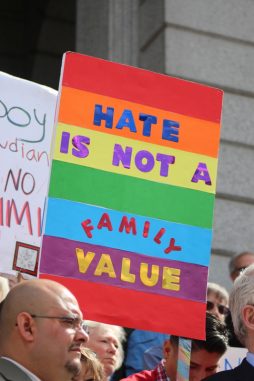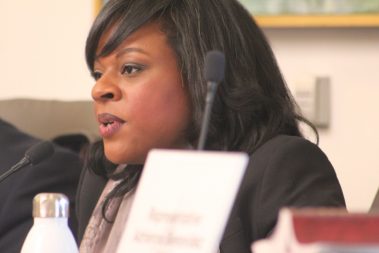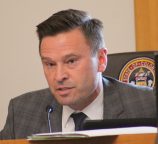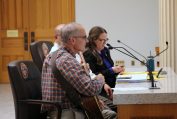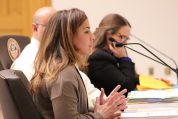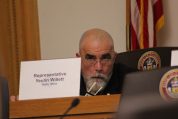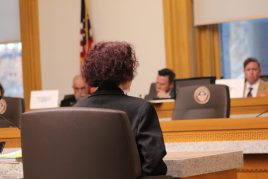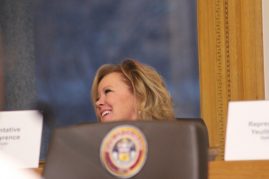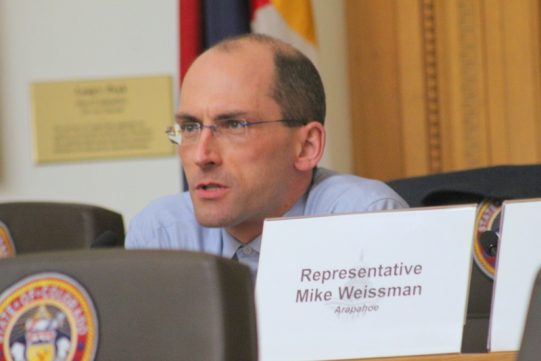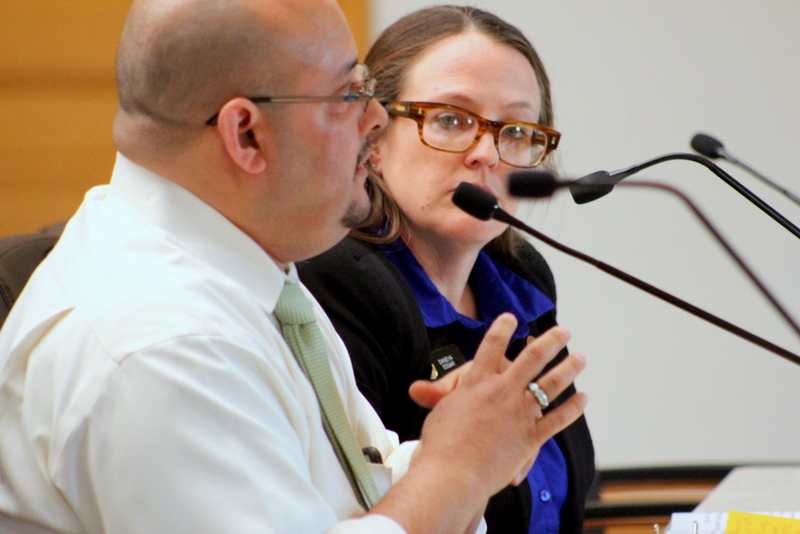 The nephew of former Governor Ralph Carr – who served Colorado from 1939 to 1943 – wrote to Colorado Representative Joe Salazar to give his blessing and support for House Bill 17-1230 the Ralph Carr Freedom Defense Act. Salazar along with Representative Daneya Esgar (D-46-Pueblo) introduced the bill in the House Judiciary Committee on Thursday.
The nephew of former Governor Ralph Carr – who served Colorado from 1939 to 1943 – wrote to Colorado Representative Joe Salazar to give his blessing and support for House Bill 17-1230 the Ralph Carr Freedom Defense Act. Salazar along with Representative Daneya Esgar (D-46-Pueblo) introduced the bill in the House Judiciary Committee on Thursday.
If passed HB 1230 would obligate the state to ensure the legality and constitutionality of federal mandates based on race, ethnicity, national origin, immigration status, or religion before the state would comply.
The bill has 35 House sponsors and 10 from the Senate. It passed out of committee with an 8-4 vote.
The bill was intentionally named after Carr for the governor’s stand against Japanese concentration camps during World War II. The naming was significant to Dr. Jo Anne Hota Fujioka who testified in committee and spoke during a pre-hearing press conference. Fujioka is a fourth-generation Japanese American and survivor of the concentration camps created after Executive Order 9066 was signed by President Dwight D. Eisenhower in 1942 interning over 100,000 of Japanese ancestry. Fujioka was a toddler when she and her family were forced into Poston, a Japanese internment camp in rural Yuma County, Arizona.
“It seems that our country learned nothing from our suffering and deprivation as we are now on the brink of falling into the same political trap.”
Fujioka referenced President Donald Trump’s recent executive orders banning entry into the US from seven and later six Muslim majority countries including those who are seeking refugee status from war torn nations. She also referred to Trump’s proposal of a Muslim registry and the increased effort by the Trump administration to deport those living in the US without current documents.
At the conclusion of Fujioka’s testimony, Judiciary Committee Chair Pete Lee addressed Dr. Fujioka, “On behalf of the committee and the people of the state of Colorado, please accept our apology for the injustice your family has endured.”
Representative Jovan Melton who is also sponsoring the bill asked Fujioka if she thought what happened to her could never happen again, “There have been naysayers who say that the bill is not necessary or that those things could never happen in America to which Fujioka responded, “It’s crazy to think it could never happen [again].”
Speaking to that point, Salazar referenced a 2016 Washington Post article where Trump backer Carl Higbie defended a Muslim registry to Fox News host Megyn Kelly saying that it was legal, it would pass constitutional scrutiny, and has legal precedent referring to Japanese internment.
Speaking in opposition to the Ralph Carr Act was Charlene Hardcastle who identified herself as a nurse and said she moved to Denver six years ago. Although Hardcastle had no data, she said she was worried about a national reputation for attracting immigrants, although she used a more derogatory term, “Illegal criminals that are released from jail throughout the country will hear that Colorado is a sanctuary state. And when they’re released, instead of being picked up by [Immigration and Customs Enforcement] ICE officials, they will make a beeline for Colorado. I think it will gain the reputation of being a sanctuary state and it will attract illegals.”
In response to this testimony, Chairperson Lee responded that as the bill reads, “The state shall not aid the federal government in arresting for a noncriminal offense. The bill is very clear about that.”
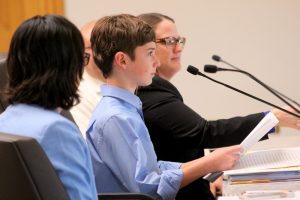 Twelve-year old Kian Ipakchi-Saiy testified early in the hearing in support of the bill. He said that he speaks Persian and German in addition to English.
Twelve-year old Kian Ipakchi-Saiy testified early in the hearing in support of the bill. He said that he speaks Persian and German in addition to English.
“I’m fortunate to be the child of two exemplary immigrants: an intercultural community advocate and a surgeon who have always taught me to always be kind and loving.” Ipakchi-Saiy said that both of his grandmothers are German while both of his grandfathers are Persian. His mother was raised in Iran during the Islamic revolution and war which claimed the lives of up to a million people.”
“In 1962 after losing her husband, my mother’s grandmother risked everything to bring her children out of communist East Germany and into safety. She courageously fled to West Germany with her children during a time when war and walls divided loved ones. My grandmothers grew up during one of the most horrific atrocities against humanity which was motivated by religious and racial intolerance and implemented by way of registries in Nazi Germany. Today as grandchildren of Iranian grandparents, my siblings and I find ourselves at a most disheartening time and place in history yet again. Due to recent executive orders and travel bans, we have spent the past few weeks in uncertainty not knowing if we would be reunited with our grandparents for Norooz, the Persian new year which takes place on the first day of spring every year. We are again hearing of the same discriminatory practices which include registries, walls, deportations, and travel bans.”
Ipakchi-Saiy added that his 13-year old friend of Iranian heritage has had to change schools because of bullying targeting his heritage through hate speech. He said that there were not policies in place enough to protect his friend, and it was his friend who bore the responsibility of keeping himself safe by changing schools. Some of that bullying involved what he described as disparaging remarks about Iran along with misinformation, “At my school I have some friends who have said for example, ‘Iran is the capital of ISIS and like ISIS is based there and that there’s the biggest majority of ISIS there and that kinda made me sad to hear so I asked my parents afterwards and they said that that’s wrong.”
The details of the misinformation were clarified by Pantea Beigi, a Denver based Iranian-American human rights advocate and board member of the Spring Institute for Intercultural Learning, “Iran is one of the countries fighting ISIS at the moment alongside other countries. What worries me is our children and the armed mindset that our citizens and our children will embody unfortunately due to lack of better information.”
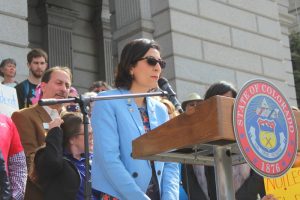
Pantea Beigi speaks at a press conference on the west steps of the Colorado Capitol prior to the hearing of HB-1230.
In testimony, Beigi described being 19-years old during the 2002 enactment of the National Security Entry-Exit Registration System (NSEERS) that targeted foreigners from 25 countries based on religion, ethnicity, and national origin. Living in Los Angeles, Beigi described the terror the Iranian community experienced, and the after-effects of the campaign years later.
“Members of my community went missing overnight and it was a very horrible experience for mothers whose 17-year old sons did not come home, for wives whose husbands with heart conditions did not come home. It took us 48 hours to find out what had happened. And what had happened was that there were public service announcements informing all Iranians that they need to register by a certain point and time at certain immigration facilities. And these were law-abiding Iranian-american citizens, green card holders, and visa holders who went in to abide by the law and register and did not come home. Many of them were shackled on sight and taken into underground holding facilities below the immigration centers. we had about 3000 Iranian men in California that were detained.
We all know what happened to this Muslim registry. There were zero terrorism convictions yielded from this Muslim Registry.. And it was a very costly registry. And it was a dangerous registry. It changed our global standing. The rationale was fear mongering. I believe Iran at the time was part of the axis of evil. And it was the same rationale of fear mongering that we are experiencing today.”
Yes votes were Representatives Adrienne Benavidez, Mike Foote, Leslie Herod, Jovan Melton, Pete Lee, Joe Salazar, and Mike Weissman.
No votes were Representatives Polly Lawrence, Paul Lundeen, Yeulin Willet, and Cole Wist.
